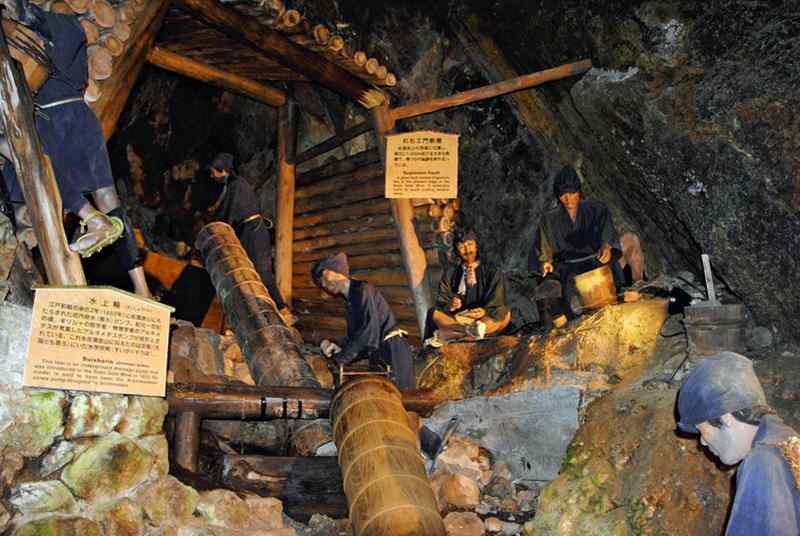
A display is seen at the Sado Gold Mine in Sado, Niigata Prefecture.
17:30 JST, January 29, 2022
Prime Minister Fumio Kishida’s decision to nominate the Sado Gold Mine for registration on the UNESCO World Heritage list was likely based on a belief that delaying a decision amid opposition from South Korea would not have been supported by members of the Liberal Democratic Party and conservative lawmakers.
Kishida chose the option that would strengthen his political power base.
The prime minister announced the nomination Friday. “People expressed various opinions based on their positions. After calm consideration, I reached a decision,” he told reporters at his official residence.
Prior to the announcement, Kishida explained his intention to former Prime Minister Shinzo Abe on the phone. “I think it’s a good decision,” Abe reportedly replied.
Kishida said to a close aide after the announcement, “The decision was my own.”
At an Abe faction meeting on Jan. 20, the former prime minister said, “It would be wrong not to make the nomination to avoid controversy.”
At the time, the Foreign Ministry was in the process of pushing for a postponement of the decision on the grounds that a backlash from South Korea, among other factors, would mean there was no prospect of the nomination being approved.
The ministry, which has consistently been cautious about heritage nominations, was criticized for its “weak-kneed” response, prompting Abe and other conservatives to raise their voices.
Last year, UNESCO introduced a system that allows countries to contest nominations for its register of historically significant documents, called the Memory of the World.
Registration cannot happen until a consensus is reached.
A senior official of the Foreign Ministry expressed concern that the nomination of the gold mine would trigger criticism of Japan, because it was Japan that led the introduction of the system following the 2015 registration of the “Documents of Nanjing Massacre” submitted by China.
“If we nominated the gold mine without coordinating with South Korea, Japan could be accused of double standards,” the official said.
However, conservative LDP members viewed the Foreign Ministry’s approach as a mere postponement. The logic of the ministry citing a system for UNESCO’s Memory of the World registration was also questioned.
“The Memory of the World register and cultural heritage are two different things. The same rules do not apply,” Sanae Takaichi, the LDP’s policy research council chairperson, said on a TV program on Jan 27.
Although the final decision on such matters is not usually left to the prime minister, Kishida listened to the opinions of people in favor and against the nomination.
“The prime minister was in a tight spot,” a government source said.
Kishida likely prioritized the stability of his political power base, choosing the one option that would avoid a possible estrangement from Abe and other party conservatives.
House of Representatives lawmaker Shuichi Takatori expressed concern that the LDP would lose support from conservative voters before this year’s House of Councillors election if the government decided not to nominate the Sado Gold Mine.
Takatori is the chairperson of the LDP’s prefectural chapter in Niigata, where the gold mine is located.
From next year, South Korea will be eligible to become a member of the UNESCO World Heritage Committee, which determines whether a property is inscribed on the World Heritage site.
Some LDP members warned that if the government did not submit a nomination this year, it would become difficult to do so in the future.
It has also been said that the prime minister’s decision might have been influenced by his distrust of South Korea. In 2015, when Kishida was foreign minister, Japan and South Korea made a joint announcement on the so-called comfort women issue, but South Korea has subsequently watered down the agreement.
Before announcing his decision, Kishida told his aides, “I’m not sure if South Korea would respond calmly even if we scrapped the nomination.”
A cabinet minister said, “The conclusion reached was reasonable.”
However, a mid-ranking LDP lawmaker said, “[The government] should have made the nomination in a way that didn’t attract attention. The Foreign Ministry failed to coordinate with the ruling parties.”
Top Articles in Politics
-

Japan PM Takaichi’s Cabinet Resigns en Masse
-

Sanae Takaichi Elected Prime Minister of Japan; Keeps All Cabinet Appointees from Previous Term
-

Japan’s Govt to Submit Road Map for Growth Strategy in March, PM Takaichi to Announce in Upcoming Policy Speech
-

LDP Wins Historic Landslide Victory
-

LDP Wins Landslide Victory, Secures Single-party Majority; Ruling Coalition with JIP Poised to Secure Over 300 seats (UPDATE 1)
JN ACCESS RANKING
-

Japan PM Takaichi’s Cabinet Resigns en Masse
-

Japan Institute to Use Domestic Commercial Optical Lattice Clock to Set Japan Standard Time
-

Israeli Ambassador to Japan Speaks about Japan’s Role in the Reconstruction of Gaza
-

Man Infected with Measles Reportedly Dined at Restaurant in Tokyo Station
-

Videos Plagiarized, Reposted with False Subtitles Claiming ‘Ryukyu Belongs to China’; Anti-China False Information Also Posted in Japan





















